Iran Has Selected Qatar As Venue For Talks With US, Official Says

Qatar will host indirect nuclear talks between Iran and the United States, a media adviser to the Iranian nuclear team was quoted on Monday as saying.

Qatar will host indirect nuclear talks between Iran and the United States, a media adviser to the Iranian nuclear team was quoted on Monday as saying.
"Iran chose Qatar to host because it is our friend," Mohammad Marandi told the semi-official ISNA news agency. Marandi who was born in the US has been a key media official for the Islamic Republic.
Since a trip by the European Union’s foreign policy chief Josep Borrell to Iran over the weekend that ended with an agreement to resume talks in a Persian Gulf country, Qatar was mentioned as the likely venue.
Year-long negotiations in Vienna to revive the 2015 nuclear agreement known as JCPOA came to an abrupt halt in March. During Borrell’s trip it was agreed that Iran and the United States will resume indirect talks apparently with a new format without the presence of Russia and China, two of the original signatories of the agreement.
It is not clear when exactly negotiations will resume and if the mediator will be the EU foreign policy team or other European diplomats from the United Kingdom, France and Germany will also be present. The E3 were also signatories of JCPOA.
There has so far been little official reaction from Washington to the EU-Iran announcement, but it appears there was coordination between the US and EU before Borrell visited Tehran.

Iran said Monday that Washington has given assurances it will carry out the 2015 nuclear deal and UN resolution 2231 and will “consider” Iran’s economic benefits.
Iran agreed on Saturday [June 25] to resume nuclear talks with the United States after the European Union’s foreign policy chief Josep Borrell visited Tehran and held talks to restart stalled nuclear negotiations.
Foreign ministry spokesman Saeed Khatibzadeh speaking at his weekly media briefing thanked Borrell and said, “We confirm that there have been agreements regarding the format, essence and topics” for the new round of talks. “The most important aspect of the talks was that America has given assurances to act based on the entirety of the JCPOA and issues covered by resolution 2231, taking into account Iran’s [expected] economic benefits” from a renewed nuclear agreement.
Khatibzadeh also seemed to hedge Iran’s bets, saying, “We must wait and see if the Americans will part with Trump’s legacy and Borrell’s messages become a reality. We will continue the talks with seriousness and decisiveness with the caveat of not fully trusting America.”
Year-long talks in Vienna came to a sudden halt in March after diplomats said that a draft agreement was 99 percent ready to restore the Joint Comprehensive Plan of Action (JCPOA). The sticking points apparently revolved around Iran’s demand that the US should lift all sanctions imposed by former President Donald Trump when he withdrew from the deal in 2018.
However, many sanctions, including the designation of Iran’s Revolutionary Guard (IRGC) as a terrorist organization were not directly related to Iran’s nuclear program and the Biden Administration has so far not accepted Tehran’s demands.
Lately, Tehran has reportedly argued that the demand to remove sanctions related to terrorism is because they would prevent full economic benefits for Iran even if the nuclear deal is restored. Khatibzadeh’s statement that the US has accepted to consider Iran’s “economic benefits” points to Tehran accepting a promise from Washington, rather than a formal removal of all sanctions.
Some observers in Iran have suggested that perhaps the issue of remaining sanctions and other differences will be dealt with after the JCPOA is restored through additional talks.
Iran’s regional aggressive behavior and its missile threat are long-standing problems that the United States and its regional allies are keen to address. The lifting of terrorism and other sanctions could evolve into a new round of talks aimed at Iran’s overall foreign and military policies.
The new talks Borrell agreed with the Iranians seem indeed to differ from the Vienna format. The talks, which Khatobzadeh said will start in a few days, are slated to take place not in Vienna but in a Persian Gulf country, most likely Qatar.
Although many details are still unclear, the talks will not take place with the direct participation of Russia and China as was the case in Vienna. It is not clear if the United Kingdom, France and Germany, as European signatories of the JCPOA will be present or only the EU will mediate in what would be indirect talks, as Iran still refuses to negotiate with the US face to face.

Israel's defense minister on Sunday said policy on the Iranian nuclear talks was set by the government, not the security forces, after a newspaper reported that key Israeli generals favor a deal between Tehran and world powers.
The chiefs of military intelligence and strategic planning believe a revival of a 2015 deal that restricted Iran's nuclear programme would gain time for Israel to prepare an attack aimed at denying its arch-foe the means to make a nuclear weapon, top-selling Yedioth Ahronoth daily said on Friday.
While the Israeli security forces have a say on Iran policy, "it is the government echelon that makes the decisions," Defence Minister Benny Gantz tweeted.
"We will continue holding the open and deep dialogue behind closed doors only. Any other manner harms the State of Israel's security."
Gantz's rebuke was apparently also aimed at the Mossad spy service, which Yedioth said opposed any new Iran nuclear deal.
The European Union and Iran agreed on Saturday that the nuclear negotiations, bogged down for months, would resume soon.
Israel is not a party to the negotiations. But its concerns about the outcome - and its long-standing threats to take unilateral military action against Iran - carry weight in Western capitals.
Israel welcomed then US President Donald Trump's decision to quit the 2015 deal, deeming it insufficient. After Trump was succeeded by Joe Biden, Israeli leaders said they would not be bound by any new deal Washington might reach with Tehran.
Report by Reuters

A well-known analyst in Iran says that the upcoming round of talks with the United States could to be the last since both sides have a convergence of interests.
Some media outlets in Iran, not directly under government management, have published interviews with local pundits about the prospects of more nuclear talks with the United States, after the visit Saturday of the European Union’s foreign policy chief Josep Borrell to Tehran.
The visit ended in a positive tone that Tehran and Washington might resume indirect talks after a hiatus since March, in a Persian Gulf country, apparently without the participation of Russia and China, two other signatories of the 2015 nuclear agreement known as the JCPOA.
Diako Hosseini, a well-known political analyst in Tehran told the Islamic Labour News Agency (ILNA), expressed confidence that Iran was already tilting toward renewed talks, even before the recent visit of Russian Foreign Minister Sergey Lavrov to Tehran. He did not say how if Lavrov’s meetings with Iranian officials helped convince them to respond positively to Borrell, or as some other Iranian experts believe, Moscow has never been helpful in Iran’s nuclear talks.
Hosseini argued that both Iran and the United States see the JCPOA as serving their interests and if talks resume, this would be the last round and agreement will be at hand.
Asked how the two sides would resolve their outstanding differences, the analyst said that it is possible they would push points of contention to future talks and focus on reviving the 2015 deal, which President Doanld Trump abandoned in 2018.

Tehran has been demanding the removal of its Revolutionary Guard (IRGC) from the US list of Foreign Terrorist Organizations (FTO). Washington has rejected the demand so far, saying that the IRGC sanctions are not related to the nuclear issue and are “extraneous” to the talks.
Hosseini seemed to be suggesting that Iran could decide not to insist on this or other demands, with an agreement to discuss them after an deal to return to the JCPOA.
“If there is a will to reach an agreement, it is possible to find formulas so that the remaining differences do not to prevent a restoration of the JCPOA,” he said.
Borrell during his visit also spoke about shared interests with Iran over energy resources. Asked if this means Europe is ready to make separate deals with Iran, Hosseini responded that there would be no guarantees from Europe but perhaps “incentives” would be offered.
Reza Nasri, another Tehran-based analyst speaking to Rouydad24 website, dismissed demands often voiced by Iranian officials for iron-clad guarantees that the US would not pull out of an agreement in the future and Europe would be forthcoming in full economic cooperation.
“In all countries, including Iran, there is concept of national interest or ‘Raison d'état’ which allows states based on sovereignty – with their unilateral decision – to abrogate any guarantee or legal obligation toward another country,” he said. Indirectly referring to Iranian officials, he quipped that “Those who beat the drums of receiving guarantees, should say what kind of guarantee they want from America that only addresses one issue.”
He also expressed the view that fast changing global conditions in recent months might have also changed calculations in Washington and Tehran.
Nasri went on to say the best guarantee is creating conditions in which the other side calculates that “breaking an agreement is more harmful than staying committed.”

G7 leaders will discuss the prospect of reviving the Iran nuclear talks after the European Union's foreign policy chief met senior officials in Tehran, a French presidency official said on Sunday.
Iran's indirect talks with the United States on reviving the 2015 nuclear pact will resume soon, the Iranian foreign minister said on Saturday amid a push by Josep Borrell to break a months-long impasse.
The official said discussions would take place on Sunday at a dinner between the leaders of the Group of Seven rich nations with more detailed talks taking place on Tuesday morning between France, Britain, Germany and the United States.
The three European powers are parties to the nuclear deal, which then-US President Donald Trump pulled out of in 2018.
The pact appeared close to being revived in March after 11 months of talks, when the process came to a halt. Tehran insisted that Washington remove the Islamic Revolutionary Guard Corps (IRGC), its elite security force, from the U.S. Foreign Terrorist Organization list.
"Talks have intensified between our teams," said the French official, adding that it was crucial to revive the pact for the nuclear non-proliferation benefits, regional security and also to see how it all fits into the question of high oil prices.
Israel has reportedly critized Borrell's trrip to Tehran and the revivial of the JCPOA, which it regards as inadequate in preventing Tehran from acquiring nuclear weapons.
With reporting by Reuters

Qatar is more likely to be the venue of talks between Washington and Tehran to revive the 2015 nuclear deal, a website close to Iran’s security council said Sunday.
Nour News, usually reflecting the views of the Supreme National Security Council Secretary, Ali Shamkhani, said, “Considering the continuing efforts by Qatar to help re-start talks for the lifting of US sanctions, Doha’s chances for hosting the upcoming negotiations are higher than other Persian Gulf countries.”
A two-day visit by the European Union’s foreign policy chief Josep Borrell to Tehran appeared to have succeeded on Saturday in convincing Iran to have talks with the United States to resolve remaining differences that have blocked an agreement to revive the JCPOA.
The key factor that prevented an agreement in Vienna in March, when year-long talks came to a standstill, is Iran’s demand for the removal of its Revolutionary Guard from a US terrorist list.
There is no official word from Washington yet, if the Biden Administration agrees with a formula to hold talks with Iran apparently outside the JCPOA framework. What Borrell seems to have agreed with Iran would probably exclude Russia and China, two of the original JCPOA signatories from this round of talks.
Washington might be waiting for a briefing by Borrell to see the details of his discussions with the Iranians, but some coordination must have taken place before the EU foreign policy chief flew to Tehran on Friday.
US Special envoy for Iran and chief nuclear negotiator, Rob Malley, was in Brussels before Borrell’s trip and a tweet on Thursday [June23] showed him having dinner with Borrell and his deputy Enrique Mora.
Al Jazeera also reported on Sunday that according to an Iranian official Qatar has the best chance for hosting the new talks.
Israel’s Channel 12 television quoted a security official as saying that Israel has objected to the prospect of the JCPOA being revived in the near future. The source said that restoring the 2015 agreement in its current form would be “very bad” for Israel.
Israel says that the JCPOA’s sunset clauses would mature in a few years and Iran would be free to expand its nuclear program and build atomic weapons. The deal was weak from the beginning when the Obama administration negotiated it, Israel has always argued and supported for President Donald Trump’s decision to withdraw from the agreement in 2018.
Saudi Arabia and its Arab allies, although less vocal publicly, are equally alarmed not only at Iran’s nuclear program but also for its aggressive regional behavior, arming and supporting militant groups.
Washington is said to be working to lead a regional alliance of Israel, Saudi Arabia and other Arab countries to contain Iran. Israeli officials said this week that work is in progress to set up a joint air defense system between these countries, led by the US.
Iran’s Shamkhani told Borrell that Iran will further develop its nuclear programme until the West changes its "illegal behavior".
"Iran's retaliatory actions in the nuclear sector are merely legal and rational responses to US unilateralism and European inaction and will continue as long as the West's illegal practices are not changed," Shamkhani said, without elaborating.
And despite the imminent resumption of talks, Borrell appeared to play down the possibility of a quick deal.
"I cannot predict ... We are pushing for it. I appreciate the goodwill from the Iranian side. There is also goodwill from the American side," Borrell said in a news conference on an EU website.